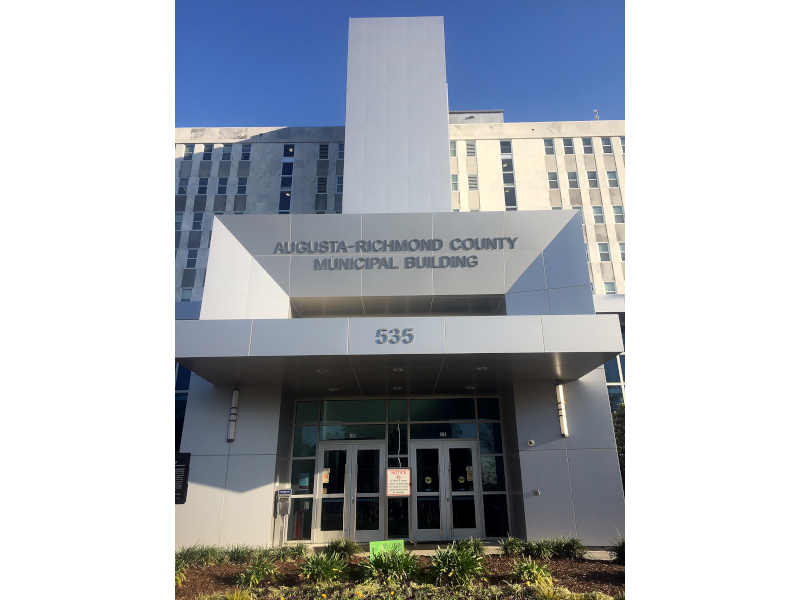An Augusta Housing Authority official told an Augusta Commission committee Tuesday the authority is taking steps to avoid mass evictions in July and August after the federal eviction moratorium ends June 30.
Housing Authority Deputy Executive Director Douglas Freeman spoke to the committee at the request of Commissioner Ben Hasan who’s concerned there will be a flood of displaced families once the eviction moratorium ends.
Freeman said he was asked to open up a conversation about displaced families due to the moratorium ending, as well as concerns about increased rental costs.
“This is a big concern for the Housing Authority,” Freeman said. “We’re taking some steps to address it. But specifically, what’s happening is when the eviction moratorium was put in place, a lot of families took that as leave not to pay rent for various reasons. Some of it is because their income dropped. Some of it is because they decided, ‘If you can’t evict me, I’m not going to pay rent anymore.’ As of today, that eviction moratorium is scheduled to end at the end of June. When that happens, we anticipate a large number of filings for evictions.”
The Housing Authority is taking steps to try to mitigate that, Freeman said.
“The first step is education,” he said. “We’ve been constantly talking with our residents and passing information on about the fact that, because their rent is income-based, if they had a drop in income due to Covid, they can request their rental amount to drop accordingly.”
In addition, renters are being reminded the moratorium was not a rental forgiveness program and that any rent they have not paid during the moratorium is still due and payable and can be cause for eviction, he said.
The Augusta Housing Authority currently:
• Assists about 6,000 families inside the city of Augusta.
• Manages 1,900 housing units with a 95 percent occupancy rate with 3,000 families on the waiting list.
• Administers 4,100 families in Section 8 housing, a 90 percent occupancy rate with 8,000 families on the waiting list.
“Finally, the federal government passed an emergency program which the city of Augusta has put into place,” Freeman said. “And we are encouraging both landlords and residents to apply for that rental assistance to see if they can recoup some of that money to pay their back rent. So, with that in place, we’re trying to avoid a mass eviction event that will probably start in July or August of this year.”
Hasan asked Freeman whether the term “voucher” was used by the authority.
“Absolutely,” Freeman replied. “The Section 8 program. Those are called housing choice vouchers. HUD publishes what they call Fair Market Rents based on a survey of rents in an area. And they take a 30th percentile of rents from the Augusta metropolitan area and set that by bedroom size for a rental amount.
“The Housing Authority then takes a utility allowance number and adds it to that fair-market rent, and we’re allowed to set what we call a voucher payment standard between 90 percent and 100 percent of that total. We’re currently at 110 percent now which is the max we can do without getting additional approval from the federal government. The exception to that is the 30907 area code. HUD has approved us doing 120 percent in that area.“
“So when a family comes to us looking for assistance, we look at all their income. We adjust their income, based on various things and come up with a number that we call a total tenant payment which is how much that resident will pay to whichever landlord it is.
“When you look at what the landlord wants to charge for rent, and if it fits within that voucher payment standard then we consider that as a manageable rental amount and approve it there.”
Hasan asked Freeman if he knew how many families are going to be impacted in the Section 8 program and housing units.
Freeman said the authority could project on the housing units because they are the landlords.
“We know who’s behind on their rent and who’s not,” Freeman said.“And there are approximately 200 families that are in that case right now which is a very large chunk. We normally never have that much that are up for eviction. That would normally be a nine- to a 12-month period of time for evictions for the housing program.”
The authority cannot give answers about the Section 8 program because they don’t have access to the landlord’s financial records.
“So we do not know who’s behind on their rent,” he said. “We do know there are landlords that have complained to us their tenants aren’t paying and haven’t been paying, but we don’t have any way of saying it’s a certain percentage or a certain number of them.”
Freeman said there were 43 new emergency housing vouchers that will have to come through the city’s Housing and Community Development Department.
Sylvia Cooper is a correspondent with The Augusta Press. Reach her at sylvia.cooper@theaugustapress.com.












